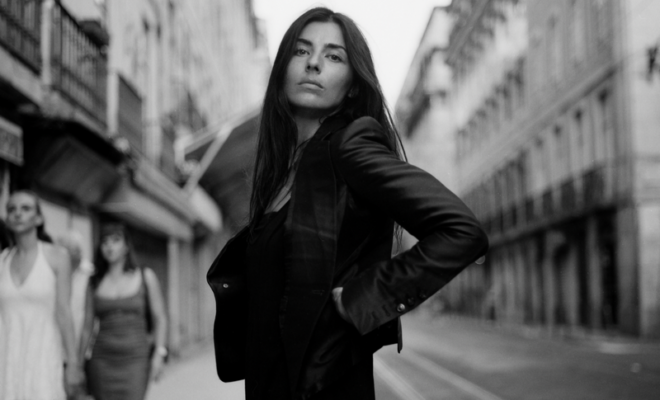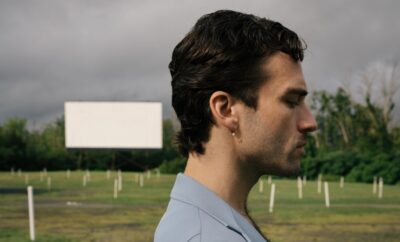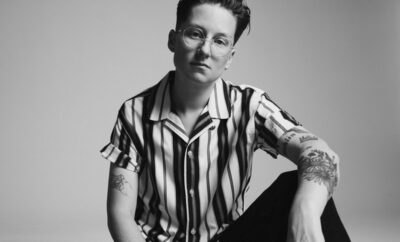 Dayran Dornelles
Dayran Dornelles
Interviews
Marie Minet – Hanoi High Life Edition Acoustic
By: Lisa Steinberg
Q) How would you describe your sound?
A) I see my music as constantly evolving. It’s a simple and sincere fusion between French chanson and world music, especially African rhythms. I never try to imitate genres, but rather let each song find its own form. It’s an intuitive and open process.
Q) Who are some of your musical influences?
A) Music has always been part of my family. My great-uncle was the Norwegian composer Edvard Grieg and I grew up surrounded by classical music—my aunt trained as an opera singer, my uncle was a pianist and my grandmother studied violin at the Conservatoire de Paris. Naturally, I was deeply influenced by composers like Bach, Chopin and Beethoven. Later on, I was drawn to the depth and poetry of French chanson, Serge Gainsbourg in particular had a lasting impact on me. Today, I admire artists like Grand Corps Malade, who bring spoken word and sincerity into music in such a powerful way. These influences continue to live quietly in everything I write.
Q) Talk about the story behind your new song “Hanoi High Life Edition Acoustic.”
A) I wrote “Hanoi” with my brother while I was traveling in Vietnam. The song came from his own story at the time, torn between two women. In the song, Hanoi and Paris symbolise those two possible love stories that he had to decide on. The song was first released in my first album, and has now found new life within my new album Clair Obscur High Life Edition Acoustic project. This version brings a new rhythm, inspired by the energy and warmth of West African Highlife music.
Q) What do you think it is about the song that fans connect to?
A) What’s special about “Hanoi,” and this whole album, is that it was composed and recorded at the same time. Everything happened in the moment, there was no separation between composing and recording, which gave the songs a very spontaneous, alive quality.
“Hanoi” was created through improvisation. I started with guitar lines that may seem simple, but are actually drawn from Highlife music – repetitive, rhythmic and subtly complex. That repetition gave me the freedom to lose myself in the process, to flow without thinking, almost like a wave. It’s the kind of moment where you forget what you’re trying to do, and simply do it.
That, for me, is the essence of creation: when the expectation and pressure disappears and only the emotion remains. The song feels raw, instinctive and honest. I think listeners can connect with that energy, even if they don’t understand the lyrics. And for those who do, there’s an added contrast between the directness of the words—sometimes even harsh—and the apparent romanticism of the melody. That tension is part of what makes Hanoi so alive.
Q) Was there something about this particular song that inspired you to make an acoustic version of the track?
A) After a transformative trip to Ghana, I felt the need to revisit my first album with new energy. Highlife music gave me a kind of creative freedom I hadn’t experienced before—it opened my voice, my presence, and my way of performing.
In Ghana, I managed to let go of self-awareness and self-criticism and just give myself fully to the music. That shift was essential for me as an artist. I wanted to bring that openness, that freedom, into the songs I had already written—Hanoi included—and let them evolve into something more alive and sincere and mature.
Q) “Hanoi High Life” has you teamed up with Joshua Moszi. What is your song writing process? Do you need music before you can create lyrics?
A) It was just the two of us, working in a very simple home setup—just a focusrite, a mic and a pair of speakers in my apartment. We originally wanted to record in a studio, but couldn’t find the place and transform this into an opportunity. We had only four days, so everything was composed and recorded in one go—no separation between composing and recording. I would listen to the guitar lines a few times, then let myself go, waiting for the melody to come naturally. Each song was captured in one take. We composed and recorded two to three tracks per day—it was intense, but one of the most creatively fulfilling experiences I’ve had so far.
Q) How much of a hand do you have in the production of your music?
A) In this project, I was fully involved from the very beginning. I composed the songs over the guitar lines and helped shape their musical direction.
The production itself is intentionally simple—just one exceptionally gifted guitarist, Joshua Moszi, deeply rooted in Highlife, who is open and sensitive enough to tune into my universe. It’s a minimalist collaboration, but one built on trust, instinct and musical dialogue. That simplicity allowed the emotion and identity of each song to emerge naturally.
Q) Your album Clair Obscur is set to release soon. Do you have a date yet for the release?
A) I am releasing this album as a completely independent artist. There’s no official release date for the full album yet, but my plan is to release one song every three weeks until the full project is out.
Q) What are some themes you will be exploring on this album?
A) This album explores love in its many forms—its intensity, its illusions, its beauty and its contradictions. Some songs speak to deep longing, others to the tension between romantic ideals and emotional reality.
Q) Will it be all acoustic performances featured on the album?
A) Yes—all the acoustic performances will be part of the album.
Q) Who would you most like to collaborate with on a song in the future?
A) In France, I would love to collaborate with Grand Corps Malade. That has been a quiet, personal hope of mine for quite some time. In Brazil, I’d be thrilled to record with Ana Carolina—she’s a brilliant artist and a dear friend.
I also have the joy of collaborating with one of Portugal’s most respected musicians and singer, someone I deeply admire and who connected with my music. We should release a duo in the coming months … to be continued.
Q) What artist/musician are you currently listening to and why do you dig them?
A) More recently, I re-discovered ANOHNI, formerly known as Antony and the Johnsons. Her music touched me deeply. There’s a rare depth and sincerity in her work that’s hard to find—both emotionally raw and spiritually resonant. Her voice feels otherworldly—almost sacred—and carries a kind of truth that stays with you long after the song ends. I feel closely connected to the emotional and artistic universe she creates.
Q) What would you like to say to everyone who is a fan and supporter of you and your work?
A) I would say please keep supporting and listening to independent artists like me. It’s not always easy for our voices to be heard widely. But I’ve always believed that if just one person is truly touched by a song, then the music has already fulfilled its purpose. That’s the kind of success I hold onto—connection. So thank you, deeply, for listening, for feeling and for giving this music a place to live. Please keep doing it.




You must be logged in to post a comment Login